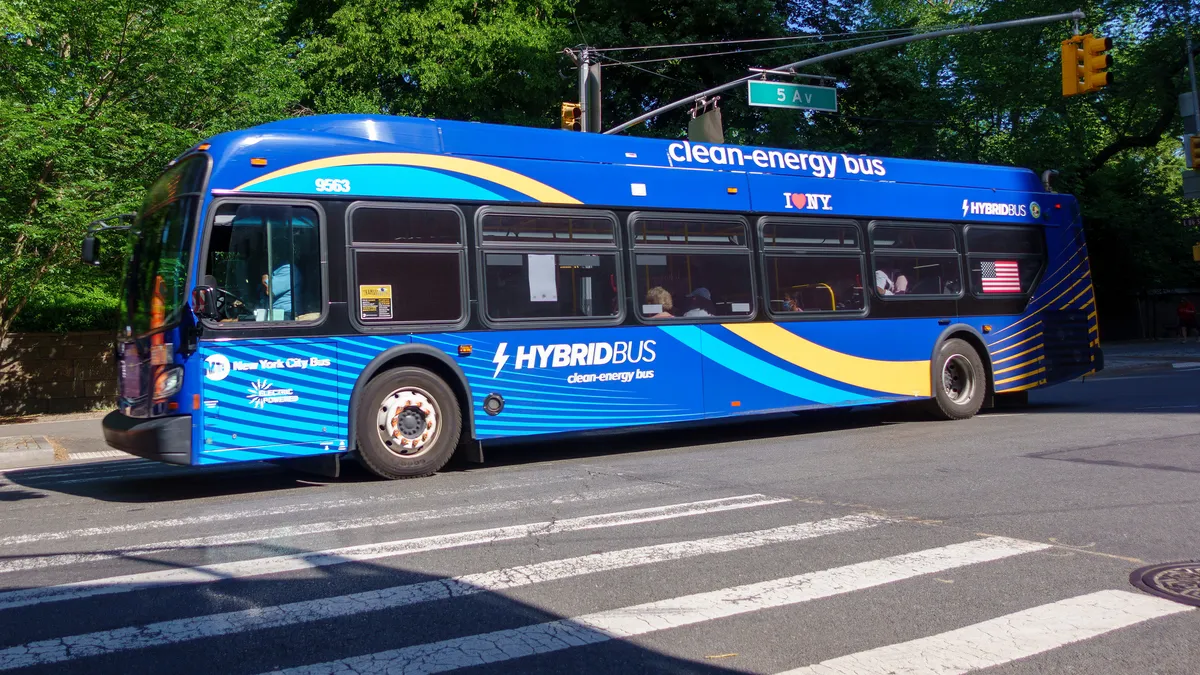Dive Brief:
- The Federal Transit Administration announced Monday nearly $1.7 billion in grants under the Buses and Bus Facilities and Low- and No-Emission Vehicle programs for transit projects in 46 states and territories.
- The awards will support the purchase of 1,700 transit buses, nearly half of which will be zero-emission vehicles, along with the construction and modernization of bus facilities, the FTA said in a press release.
- Demand for the grants far exceeded availability, with the FTA receiving 475 eligible project proposals totaling some $8.7 billion in requests.
Dive Insight:
At the end of last year, nearly 5,500 full-size zero-emission transit buses were on the road, on order or funded in the U.S., a 66% increase over the previous year.
Including the newly announced grants, the investments from the 2021 infrastructure law now total “more than $3.3 billion in American transit buses and the infrastructure that supports them over two years of funding,” said White House Senior Advisor and Infrastructure Coordinator Mitch Landrieu during a White House press call on Thursday. Landrieu added that the grants also “put money into training the workforce that will operate and maintain these buses.”
But Transportation for America, an advocacy organization, contended in a May white paper submitted to Congress that the Low- or No-Emission Vehicle Program “is artificially constraining the conversion to zero-emission vehicles” because of its statutory requirement to set aside 25% of funds for projects using low-emission fuels.
Transportation for America found that while 88% of grant applications were for zero-emission buses and facilities, more than two-thirds of those applications were rejected, while nearly 100% of applications for projects for diesel hybrid and compressed natural gas buses were approved.
During the press call, FTA Deputy Administrator Veronica Vanterpool said, “Sometimes an agency is just not ready yet to make that transition.” She said that the Monday grant announcement will fund 700 zero-emission vehicles, approximately 610 low- or no-emission vehicles and about 400 traditional vehicles. In a follow-up email, an FTA spokesperson clarified that “Many of the traditionally-fueled vehicles will be smaller buses and vans for rural service and paratransit service, where there is not a strong zero-emission product base yet.”
Among the grants just announced are funds for the following bus purchases and bus facilities:
- King County Metro Transit in Seattle was awarded $33.5 million for approximately 30 battery-electric buses, along with charging equipment and worker training. The project will bring electric buses to 27 bus routes that serve low-income areas.
- The Ohio Department of Transportation was awarded $29.3 million to help 10 transit agencies buy low- or no-emission buses to replace older vehicles in rural and urban communities.
- The Washington Metropolitan Area Transit Authority was awarded $104 million to convert its Lorton, Virginia, bus garage to a fully electric facility and to acquire approximately 100 battery-electric buses. The grants will also fund a workforce-training program for drivers, mechanics and first responders.
Although many applications in this funding round were not approved, Vanterpool said those applicants “can receive useful information” in a debrief from the FTA, “and what we’ve seen is that debrief often results in very successful applications the next time around.”
Vanterpool described the characteristics of successful proposals: “Those that show demonstration of need, demonstration of benefit, that can identify the planning process and local prioritization, that demonstrate local financial commitment, that have a project implementation strategy, and those applicants which demonstrate technical legal and financial capacity.”
















